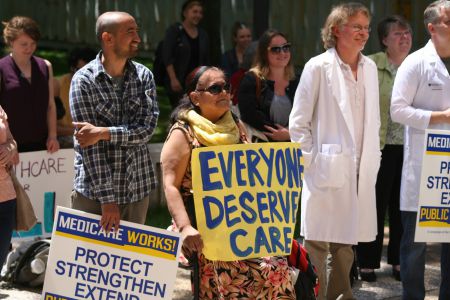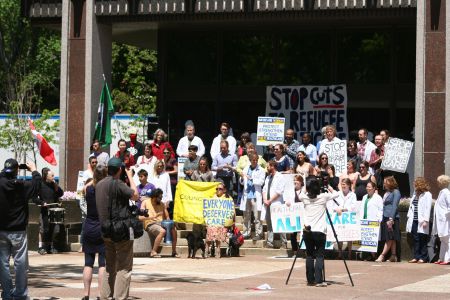KJIPUKTUK (Halifax) - Many refugees, after having endured all kinds of unimaginable hardships, cannot access physicians, medication, dental and vision care when they finally reach Canada.
That's not right, says Dr. Tim Holland, a physician who works with the Halifax Transitional Health Clinic for Refugees.
“At every clinic we hold we see patients who are affected by this in horrible ways,” says Holland. “It really limits the access to specialist care, to dental care, to all the kinds of healthcare beyond what we offer at our clinic.”
“Every time we send somebody to a specialist, we are not sure if it will be covered. We don't know if patients will get a bill they can't afford,” he says.
Holland was one of the forty or so healthcare workers,refugee activists and citizens who attended a rally in the courtyard of the Dalhousie Medical School. Similar rallies occurred today in many other cities across Canada.
These rallies have been happening for four years now, ever since sweeping refugee health care constraints were first imposed by the federal government in 2012.
Last year the Federal Court ruled that the cuts were “cruel and unusual,” and hence unconstitutional.
Since that ruling the government reinstated some types of healthcare for some categories, but many refugees are still left without coverage. And the government is appealing the ruling.
As a result refugee clinics now struggle with a system that is so complex that it becomes a hurdle all on its own.
“At our refugee clinic, if we see a refugee claimant we don't even bother to bill. It isn't worth our time to go through the complexities of paperwork,” says Holland.
The lack of dental care is one of the biggest challenges, Holland believes. Many of the refugees have been in camps for years without any access to dental care.
“We see people with awful toothaches and horrible cavities, unable to eat, it is just abhorrent that we can't get the proper coverage for these refugees,” says Holland.
Dr. Timothy Bood is an emergency medicine physician who also works shifts at the Halifax Refugee Clinic. The current constraints are damaging in a variety of ways, he tells the Halifax Media Co-op.
“People ending up at emergency departments, people not seeing doctors at all and suffering the health consequences, women not getting pre-natal care, that list goes on,” he says.
For one thing, that's expensive, he says, dismissing any claim by government that this is a cost-saving measure.
But more importantly, it's plain wrong.
“It is inhumane and cruel. Something that would truly outrage most Canadians if only they were aware of it,” says Bood.
“People like to have this idealized vision (of Canada), that we are humane and receive people who arrive here as refugees with open arms,” Bood says. “But the truth is otherwise. This government does not support the most vulnerable.”
Holland agrees. And he hopes Canadians will remember when they go to the polls come October.
“I really hope Canadians to make this an election issue,” he says. “Not just for the sake of refugees, but to stand up for what we believe our core values to be.”
The rallies in Halifax and other cities were organized by a coalition of local and national groups and coordinated through Canadian Doctors for Refugee Care. The group explains how you can show your opposition to the cuts here.
Follow Robert Devet on Twitter @DevetRobert




